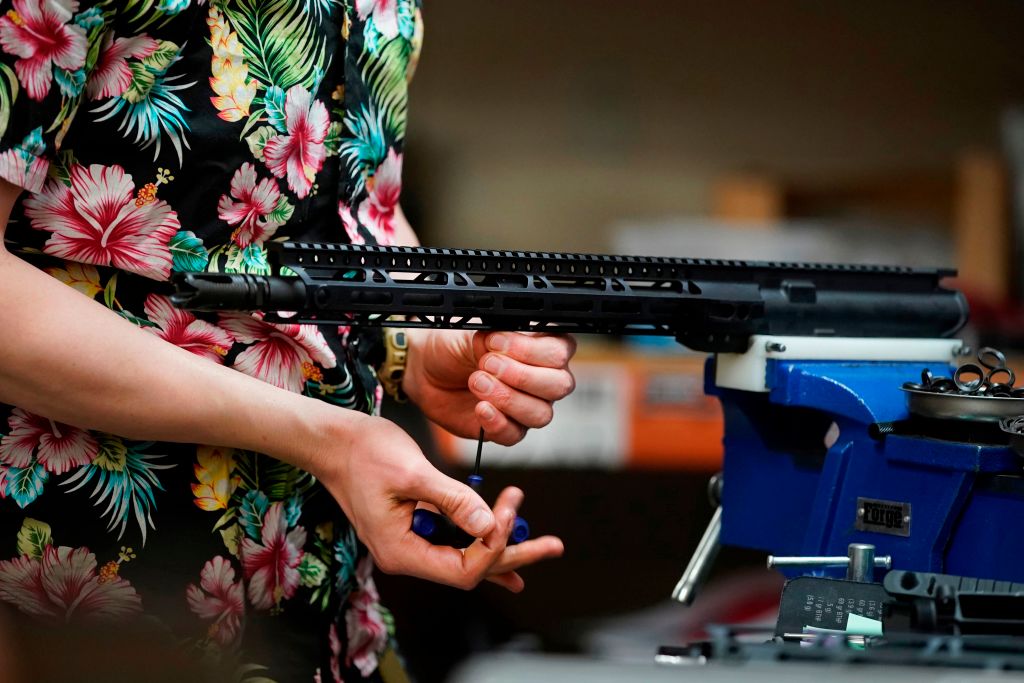DOJ Releases Proposed Rule to Regulate Ghost Guns; Would Require Background Checks, Serial Numbers Before Selling Gun Kits

Photo by GEORGE FREY/AFP via Getty Images.
The Department of Justice released a notice of proposed rulemaking Friday that would update the definition of “firearm” for the first time since 1968, in an effort to regulate so-called “ghost guns.”
According to the press release on the DOJ website, the goal is to “help close a regulatory loophole associated with the un-serialized privately made firearms that are increasingly being recovered at crime scenes across the country.”
The issue centers around guns that can be assembled from kits, that currently are allowed to be sold without serial numbers or a background check. The proposed rule, signed by Attorney General Merrick Garland, would change the definition of “frame or receiver” in order to bring these gun kits under the definition of firearm, thereby making them subject to federal regulation and, according to the DOJ, easier to prevent being sold to convicted felons or other prohibited purchasers, and to track weapons that are used in crimes.
The rule would also require retailers to run background checks “before selling kits that contain the parts necessary for someone to readily make a gun at home,” require manufacturers to “include a serial number on the firearm ‘frame or receiver’ in easy-to-build firearm kits,” and would also require federally licensed firearms dealers to add serial numbers “to 3D printed or other un-serialized firearms they take into inventory.”
More than 23,000 un-serialized firearms were recovered by law enforcement from 2016 to 2020, reported the DOJ. Those weapons were involved in 325 homicides or attempted homicides.
Once the proposed rule (ATF proposed rule 2021R-05) is published in the Federal Register, there will be a 90-day public comment period.
Both Garland and President Joe Biden have publicly spoken in support of closing this so-called ghost gun loophole. Back in April, Biden had instructed DOJ and the Department of Alcohol, Tobacco, and Firearms (ATF) to develop rules to accomplish this goal.
Stephen Gutowski at The Reload has a detailed analysis of what the rule change could mean, including some of the definitional issues that will need to be debated:
Under the current rule, a gun part can only be regulated as a receiver if it has several key components, including the trigger mechanism and breach. The proposed rule would change that to let the ATF regulate a part as a receiver if it includes just one of those components. It would also add language to the definition allowing the ATF to regulate anything that could be “readily” made into a firearm receiver as though it were a finished receiver.
The proposed rule does not provide a set of objective standards for what constitutes “readily” convertible. Instead, it relies on subjective measures of how long the conversion could take, how difficult it could be, and what tools could be required. The agency pointed to court cases for examples of what readily meant. In one example the agency said a part being completed during “an eight-hour working day in a properly equipped machine shop” qualified as “readily” convertible.
Most AR-15 unfinished or “80 percent” lowers currently on the market can be finished in far less than eight hours with proper equipment, making it possible for ATF to determine the lowers need serialization at practically any point in the manufacturing process. And sales of any kind of unfinished lower could require a federal firearms license and background checks on buyers, if the ATF decides so.




